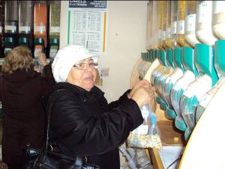La paserelle d’eau de Robec / Social Grocery shop
May 28, 2013
Contributor: Lyon
Workshop:
Social inclusion, job creation, economics/ Eating more sustainably within a limited budget
A social grocery helping deprived population for a better access to basic and sustainable products / creation of a social link between people in need and residents from the district.


“la Passerelle d’eau de Robec” is an NGO settled in the 1st district of Lyon, an old part of the city centre. In 2001, beside the usual activities such as social care for deprived population, workshop and events to strengthen social link, “la Passerelle d’eau de Robec” created a social grocery shop based on a new concept. According to a study led in the neighbourhood and the OTAWA chart, the link between health and precarious living was spoted. The NGO decided to act for deprived population on food diversity along with a social support. The social grocery shop sells various products, from social care to organic local fresh products, not only to deprived population but also to citizens eager to contribute to this solidarity action.
The social grocery has different suppliers:
– NGO: hygiene products, fresh products, fruits and vegetables …
– Private companies: Organic and fair trade products, bulk…
– Short chain suppliers (producers) :fresh local products
– Food collection and the Food Bank (fresh products, milk …) for few weeks still. But the Food Bank doesn’t allow selling other products than social care food. This disagreement will end the contract with the social grocery
Initial motivations:
– Giving access to food products for deprived people in order to maintain their autonomy and dignity.
– Protecting the quality of alimentation, and therefore a better health.
– Creating a place for meetings/ sharing knowledge to promote the social link.
– Developing social diversity around a common project.
To reach those goals the grocery created a system to blend organic and social care food products at the same place. And therefore, blending populations with different social backgrounds
A double rate system: 2 kind of members are allowed to buy at the grocery
1) Beneficiaries members
The association defined several criteria to become a member who can benefit from products proposed by the social grocery:
– Having financials difficulties (very-low or no income)
– living in the 1st or 4th district from Lyon (area of the grocery)
– Having a support given by the social or associative network
– Being involved in a personal life project (job, accommodation, health etc.)
A purchasing power is calculated depending on resources and expenses from people. With only 6 Euros left per day per person, the people can be considered as a beneficiary. The membership costs 3 €, and allows access to all the products proposed by the grocery during one year renewable. Members can buy ethic products such as organic, fair or local, at a lower price: about 50% less than average market price.
2) Members who want to support an ethical/social project
Those members are funding part of the grocery’s project. For them, the membership costs 10 €, and they can only access to organic, local and fair trade products. They accept to pay the products slightly more than the market price. However, they are not able to access to products at a lower price only addressed for beneficiaries.
Organic products are sold in bulk, lowering the price.
Of course, offering a wider choice of products isn’t enough, and the NGO reinforces this action with educational workshops and events about food, cooking, buying,etc…
“La passerelle d’Eau de robec” acts on a global “social care package”.
Economical benefits:
Deprived population can access to sustainable food and responsible consumption which is conventionally reserved to people who have a better purchasing power and a better awareness of the importance to eat quality and sustainable food.
Social benefits:
– Reinforcing social link thanks to a support and a follow-up given by a social worker for deprived persons.
– getting the members involved in the grocery’s projects: food collection, festival, store shelves, labelling, workshops (about cooking, nutrition and so on)
– Blending population with different social backgrounds
What are the lessons learn to be used/transferred/implemented in the other partner cities?
Not easy to duplicate, local population around the grocery has to be mixed, and not only deprived
Regarding rules and policy about double rate, this action is “on the edge”. You have to be a member to be allowed to buy.